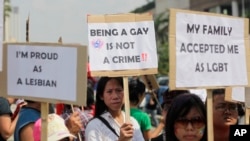Angie Abadi is a 45-year-old lesbian who now lives with her partner in Hobart, Tasmania.
But she was born and raised in Yogyakarta, Central Java. When she was 12, she realized her attraction to the same gender. But not until she was in university did she come out to her parents about her sexual orientation. Luckily, her parents accepted her despite the social risks.
Not everyone is so accepting in a society where anti-gay rhetoric is still common and public figures quickly speak out against lesbians, gays, bisexuals and transgendered people (LGBT).
Angie realized that living as a lesbian in Indonesia might bring social problems to her family.
“I want to live in somewhere else out of Indonesia, far far away from my family, that’s what in my head when I realized that I was gay, because I know that the way I am is going to influence my family,” Abadi said.
In 2002, Angie decided to pack her bags and moved to Australia.
LGBT spotlight
Being gay or lesbian has never been outlawed in Indonesia, except in the province of Aceh, where sharia, or Islamic law, has been implemented.
But recent controversies about gays and lesbians in Indonesia have been surfacing in the public and on social media. It was started by outrage over a counseling brochure distributed by a gay support group.
Support Group and Resource Center of Sexualities Studies (SGRC), established at the University of Indonesia in 2014, says it aims to promote, educate and develop programs related to sexuality, reproduction and sexual orientation. SGRC has been criticized and accused by public officials as being pro gay rights.
Lack of understanding
Andreas Harsono, an Indonesian researcher for Human Rights Watch says the gay and lesbian community in Indonesia has been facing discrimination for years despite their reluctance to campaign for rights like same sex marriage.
He said this minority group only wants certain rights to be respected, like the rights to be able to work and gather with the community where they can freely express themselves, discuss or ask questions about being different.
“But now it’s becoming more complicated for them just to ask a question, poor them. There are so many people who have given anti-LGBT comments who don’t understand the real problem,” Harsono said.
Restriction implementation
The Indonesian Broadcasting Commission banned radio and television stations from airing any program that portrayed lesbian, gay, bisexual and transgender behavior as normal.
The ban reportedly followed a meeting with the Indonesian Child Protection Commission, which was concerned about the increasing number of television programs starring members of the LGBT community.
Before that, the Indonesian government ordered the instant messaging app called Line to remove all same-sex emojis or be banned from the country.
Ismail Yusanto, a spokesman from one of the biggest Muslim organizations in Indonesia, Hizbut Tahrir Indonesia, believes the government should make regulations to ban LGBT activities and action before the community grows too large.
Yusanto added LGBT people can be "back to normal" after they repent.
“We believe that based on science and according to experts that actually LGBT [people] could become normal,” Yusanto said.
The belief that sexual orientation is a contagious disease that can be cured is common in Indonesia, where the sentiment frequently shows up in social media comments.
The lack of understanding and education about LGBT in Indonesia often creates wider prejudice, according to Hartoyo, director of an NGO that supports LGBT rights.
“For the LGBT issue in Indonesia, [we] don’t have many information about LGBT rights, or information about sexuality, about gender identity, about sexual orientation. So [its a] very moral panic,” said Hartoyo, who goes by one name.
Many who are fighting for public education and for the rights of gays and lesbians say they are no longer safe, saying they have been the targets of threats and intimidation in the past month.
The growing discrimination and intolerance related to LGBT draw the attention and concern of Angie in Tasmania. In her home town, authorities have decided to close down an Islamic school for transgender students after receiving pressure from local religious hardliners.





